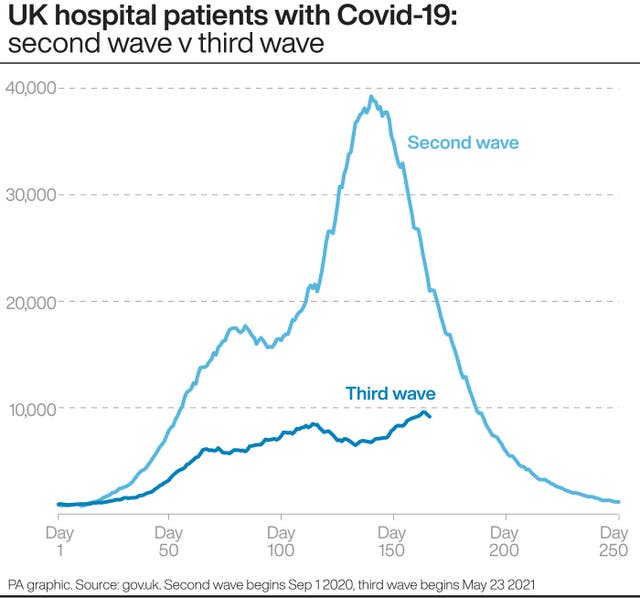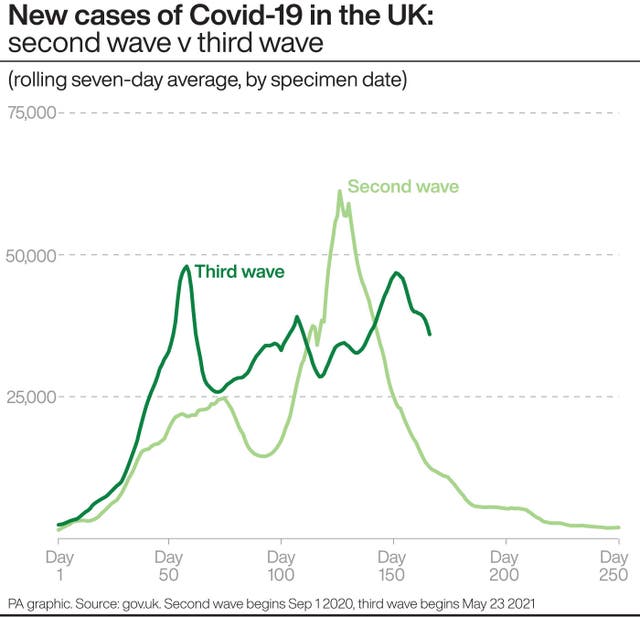UK a ‘long way’ from thinking about a Covid winter lockdown – expert
The Government’s ‘Plan B’ for managing coronavirus allows for the return of mandatory face masks, vaccine passports and work-from-home guidance.

The UK is “a long way away” from thinking about a winter lockdown, a leading scientist advising the Government has said.
Dr Mike Tildesley, a member of the Scientific Pandemic Influenza Modelling group (Spi-M), said “we are not out of the woods yet” as he urged people to have their flu and Covid-19 booster vaccines.
Asked about the prospect of a winter lockdown, he told Sky News: “I think we’re a long way away from thinking in those terms.
“I think that, clearly, there is a situation that, if the NHS is under severe pressure, if the number of deaths sadly starts to increase, then of course, obviously, there may be discussions around whether more restrictions need to come in.
“I would hope that, with a very successful vaccination campaign, the idea of a winter lockdown is a long way away.
“But it is certainly true that, if we don’t get good immunity across the population, there may need to be perhaps further measures taken.
“So it’s really important that we encourage people to come forward when eligible to take those booster jabs.”

It comes as Prime Minister Boris Johnson urged those eligible to book their booster vaccinations.
He told broadcasters during a visit to a hospital in Hexham, in the North East: “I’m here to look at what we’re doing to encourage people to get their booster jabs and that is the single most important thing that the Government can do at the present time.
“Unfortunately, what you’ve got at the moment is a situation in which the waning of the original two jabs is starting to see too many elderly people getting into hospital.
“Sadly, the jabs do wane. We’ve done 10 million booster jabs already and it’s a very effective thing.
“It’s a wonderful thing, people get 95% more protection, so I’m encouraging everybody today to go online if you’ve gone over five months, you can go online and book.”
The NHS has opened bookings for those needing a booster if five months have passed since their second dose so they can have a top-up jab at the six-month point.
Elsewhere, Education Secretary Nadhim Zahawi suggested that Covid booster jabs will become an annual vaccination programme.
“We will, I hope, be the first major economy to transition from pandemic to endemic, and have an annual vaccination programme,” he told the Sun.
Asked about the prospect, Dr Tildesley said he agrees it may become the case that people need booster jabs every year.
He said: “I think it’s possible. I remember having these sorts of discussions about nine months ago when the vaccinations were starting to roll out, that it’s possible that this virus could become endemic, so circulates in the population every year in the way that flu does.
“It’s possible that every year we’re having to go out and get our Covid jabs in the same way a lot of people are currently getting their flu jabs.”
Dr Tildesley said the booster programme is “going in the right direction but there clearly is work to do for the people over 50, for vulnerable adults”.
He added: “Immunity will be starting to wane from the second jab so it is really important that that acceleration continues and hopefully we get as many people protected as possible as we move into the colder months.”

As of Thursday, there were 9,160 people in hospital with Covid-19 across the UK, while, as of Sunday, 1,174 deaths had been recorded in the last week, up 6.8% on the week before.
The number of Covid cases after a positive test are falling, with 30,305 recorded on Sunday. Over the last week, the figures have fallen 12.9%.
Professor Peter Openshaw, a member of the New and Emerging Respiratory Virus Threats Advisory Group (Nervtag), said on Monday that the need for boosters has become “very clear”.
The professor of experimental medicine at Imperial College London told Times Radio: “We don’t know how long a vaccine is going to last until we’ve had sufficient time to watch the immunity drifting downwards, and I think something which has become very clear recently is that these vaccines don’t appear to be forever – they do provide a lot of protection, but they have to be boosted.”
He said the NHS is in a serious situation and coronavirus “is not over”.
“There’s an awful lot of Covid still around,” he said.
“At the moment we’re seeing admission rates running at something like 1,000 people per day and there’s currently over 1,000 people on mechanical ventilators in our hospitals.
“And I just don’t think people realise the serious situation that there is out there in the National Health Service hospitals, with so many people on ventilators and over 9,000 people actually in the hospital currently with Covid-19.
“Covid isn’t done. It’s not over.”
Over the weekend, a senior government scientist said older people who are double-jabbed are dying of Covid-19 because they are not taking up the offer of a booster.
Dr Susan Hopkins, chief medical adviser at the UK Health Security Agency, urged more over-50s to come forward for a third dose to cut the risk of “a long and difficult winter” for the NHS.
“Increasingly, because of immune-waning effects, there are deaths in the vaccinated group,” she told the BBC.
Elsewhere, Chris Hopson, chief executive of NHS Providers, which represents England’s NHS trusts, told Times Radio that hospitals in England are under “unprecedented” pressure but NHS staff realise that the country must now live with Covid.
He said: “We’re seeing bed occupancy levels of 94%, 95%, 96% at this point, before we’re into peak winter.
“We’ve not seen that before. That’s unprecedented. So there’s a real sense that the NHS is going to be under real pressure.”
He added, however, that vaccines are having a dramatic impact.
“I think all of us in the NHS recognise that we are moving from a situation of a pandemic towards an endemic where we need to live with Covid,” he said.
“And the bit I’m really keen for people to understand is that everybody in the NHS absolutely recognises that it’s our job to cope as best we can with Covid pressures, without resorting to the very draconian lockdowns that we’ve had to go through before.”





